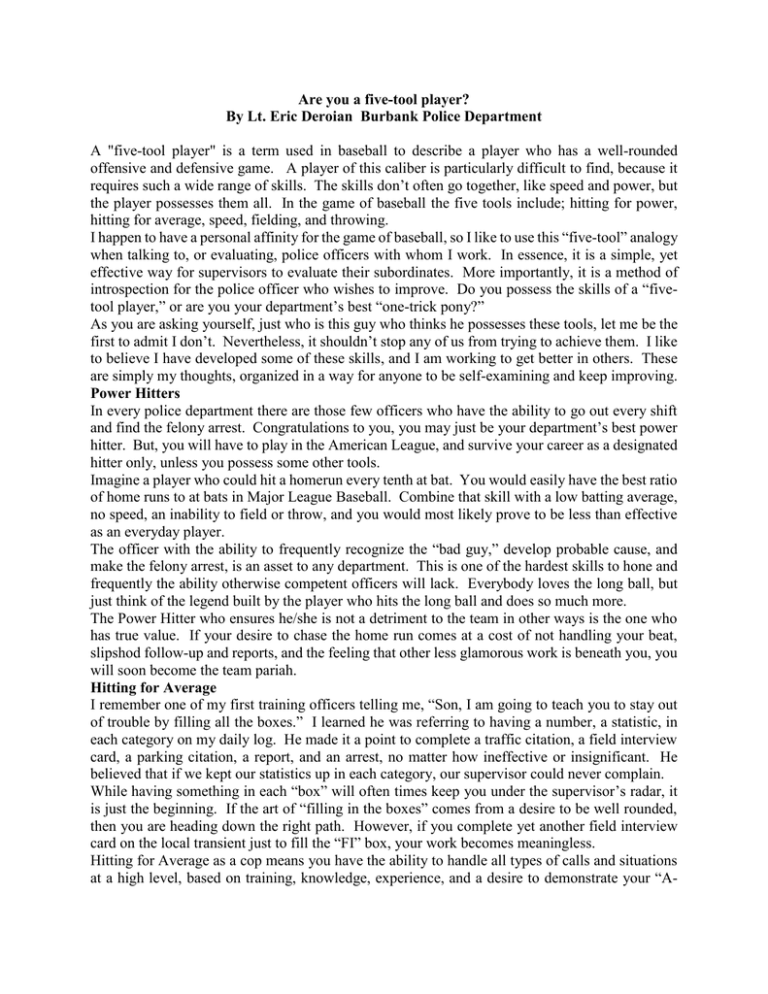Are you a five
advertisement

Are you a five-tool player? By Lt. Eric Deroian Burbank Police Department A "five-tool player" is a term used in baseball to describe a player who has a well-rounded offensive and defensive game. A player of this caliber is particularly difficult to find, because it requires such a wide range of skills. The skills don’t often go together, like speed and power, but the player possesses them all. In the game of baseball the five tools include; hitting for power, hitting for average, speed, fielding, and throwing. I happen to have a personal affinity for the game of baseball, so I like to use this “five-tool” analogy when talking to, or evaluating, police officers with whom I work. In essence, it is a simple, yet effective way for supervisors to evaluate their subordinates. More importantly, it is a method of introspection for the police officer who wishes to improve. Do you possess the skills of a “fivetool player,” or are you your department’s best “one-trick pony?” As you are asking yourself, just who is this guy who thinks he possesses these tools, let me be the first to admit I don’t. Nevertheless, it shouldn’t stop any of us from trying to achieve them. I like to believe I have developed some of these skills, and I am working to get better in others. These are simply my thoughts, organized in a way for anyone to be self-examining and keep improving. Power Hitters In every police department there are those few officers who have the ability to go out every shift and find the felony arrest. Congratulations to you, you may just be your department’s best power hitter. But, you will have to play in the American League, and survive your career as a designated hitter only, unless you possess some other tools. Imagine a player who could hit a homerun every tenth at bat. You would easily have the best ratio of home runs to at bats in Major League Baseball. Combine that skill with a low batting average, no speed, an inability to field or throw, and you would most likely prove to be less than effective as an everyday player. The officer with the ability to frequently recognize the “bad guy,” develop probable cause, and make the felony arrest, is an asset to any department. This is one of the hardest skills to hone and frequently the ability otherwise competent officers will lack. Everybody loves the long ball, but just think of the legend built by the player who hits the long ball and does so much more. The Power Hitter who ensures he/she is not a detriment to the team in other ways is the one who has true value. If your desire to chase the home run comes at a cost of not handling your beat, slipshod follow-up and reports, and the feeling that other less glamorous work is beneath you, you will soon become the team pariah. Hitting for Average I remember one of my first training officers telling me, “Son, I am going to teach you to stay out of trouble by filling all the boxes.” I learned he was referring to having a number, a statistic, in each category on my daily log. He made it a point to complete a traffic citation, a field interview card, a parking citation, a report, and an arrest, no matter how ineffective or insignificant. He believed that if we kept our statistics up in each category, our supervisor could never complain. While having something in each “box” will often times keep you under the supervisor’s radar, it is just the beginning. If the art of “filling in the boxes” comes from a desire to be well rounded, then you are heading down the right path. However, if you complete yet another field interview card on the local transient just to fill the “FI” box, your work becomes meaningless. Hitting for Average as a cop means you have the ability to handle all types of calls and situations at a high level, based on training, knowledge, experience, and a desire to demonstrate your “A- game” at all times. The Power Hitter, who “mails it in” when the call is not his/her specialty, then becomes the weak link. Be able to handle the community service call, vandalism call, or bicycle theft call, with the same professionalism and zeal as the “big felony,” and you will be hitting for average. Speed Speed in this analogy refers to motivation, effort, and pro-active police work. A great supervisor might be able to help you develop this tool, but don’t count on it. Let your motivation come from within so your legacy is not simply, “well, he handled his beat.” As a young officer I learned, just like you, how to avoid work if I wanted. There is always a veteran whose upbringing and moral compass allowed him/her to believe that his/her ability to outsmart supervisors, and avoid work, was somehow a badge of honor. Examples include: the secret place to hide where you won’t be found, the delay in clearing your call to force another officer to handle a pending call, or just taking an unnecessary amount of time to write a report; we all know the tricks. As a young boy I remember my father telling me that my last name was given to me from him, and that I was never to dishonor it. He let me know that it came with a responsibility. Now when I see an officer with enough time on the job and the know how to avoid work, who uses that knowledge to be a slug, I immediately think of his/her parents. I wonder, did the parents not teach him/her honor and pride? Does that officer not understand these concepts, or is he/she choosing to ignore them? What possible transgression could have occurred to make that officer believe the answer is to be less honorable than he/she is capable of being? Do they think they are teaching the administration a lesson? Just remember you are also teaching the same lesson to your peers and family. I have heard officers preach that police work is just a job, to keep it in perspective, and that their family comes first. I can’t say I disagree with that statement. However, as the dad of an 11-yearold daughter, I have to realize that how I speak about work, the effort I show, the pride I take, is all being witnessed by her. I want her to see great work ethic. I want her to know that her dad has an important job and that he does it to the best of his ability. I want to instill in her the character that my father instilled in me. Ask yourself if your family/children would be proud of you if they knew how you really went about your business. Then decide if you are giving the appropriate effort. Speed in your daily duties means continuous effort, continuous pride even in the mundane, and demonstrating a moral compass worthy of emulation to all who bear witness. Fielding As a police officer on patrol we are taught to be in a heightened state of awareness. Some may color code it, white, yellow, orange, or red. But, how prepared you are, what position you put yourself in, what knowledge you possess, will all be factors in how you will respond when the ball gets hit your way. A great shortstop will sometimes wait for a ball hit to him, square his feet, glove down, and make a play. Other times the shortstop needs to charge the ball, avoid the in-between hop, and be aggressive to have any chance of getting the runner. In your career you need to be constantly fielding knowledge and scooping it in. Many of the tools you will learn will come informally from watching and listening to others. Some will come from mandatory “check the box” training. With that knowledge you will most likely be able to handle all of the soft grounders that come your way. Charging the ball is a different story. In order to be the type of player who can make these plays you are going to need to seek out advanced and formal training. I recognize that not all agencies are equal when it comes to endorsing training. Stop making excuses! Set a 1, 3, and 5 year educational schedule for yourself. Be prepared to spend some of your own time and money if you want to excel. If you love narcotics, get narcotics training. But, loading your resume with narcotics related classes will only help you in that one area. Think “one-trick pony!” Challenge yourself by taking classes in areas you are not as comfortable. All too often I see the Power Hitter who already has an excellent understanding in his favorite field requesting yet another class in that same field. Becoming an expert, in any field, is a good thing. Being an expert in a specific area and above average in all others is even better. Some of the Power Hitters I have come across can’t complete a traffic accident report correctly, seem unable to handle a sexual assault case, or are lost when it comes to investigative follow-up. If it isn’t what they “like” to do, they tend to be sub-par. If I am picking my fantasy team, or a field training officer cadre, you’re not on it! With regards to formal education I have a few thoughts. First, formal education is always great resume fodder. There are many agencies that will give educational pay incentives, or even have educational requirements for promotion. The formal education process should never stop. Continue to pursue “the next degree.” Secondly, my parents drilled into my head from a young age that I was expected to surpass the limited college education either of them had. I think good parents always want more for their children. When your children see that mom and dad both have advanced degrees, it will hopefully become their expectation to follow. It can have the same effect on your co-workers, too. Throwing So now you are a great cop. You can find the felony suspect, you can handle all the different types of calls that come your way, you have a work ethic to emulate, and you have all the education (formal and informal) to impress everyone. What are you going to do with it all? The first four tools are all about you, the selfish aspects of law enforcement. With these tools discussed so far you will no doubt have a successful career as a police officer. Many commendations and a medal or two will probably be forthcoming. But ask yourself some more questions. Can I teach others? Can I lead them? Can I communicate with my peers and the public effectively? This fifth tool is the ability to combine all of your attributes and give back. Giving back to your coworkers, the community you serve, and even officers from other departments. Teaching is one aspect of this tool. The first way we teach is by example. Let others see that you are above reproach. Show them that even with all the restrictive policies, laws, and landmines, how an honorable cop can still make a difference. Let them know that the slightest embellishment or shortcut of the law is not necessary or moral. There is only one way to accomplish this and that is with ethics and nobility. Teaching as an FTO or supervisor is one of the best ways to give back to your organization. If you are not in the giving mood, think of it in this selfish way. What kind of folks do you want to work with? Who do you want backing you up? What kind of reputation do you want for your agency when it comes to your next contract? Whether it is in roll call, a classroom, or in the field, take these opportunities to teach those who will listen and you will benefit in the end. The community also needs interaction. If you want to work in an environment where you guarantee the greatest amount of public support you need to put in the effort. For most police officers this is the most uncomfortable of all details. However, it may provide the most benefit for all. Participating in community events, town hall meetings, citizen academies and other affairs is the first step in community policing and will keep you abreast of community concerns. Conclusion I think we need to ask ourselves how the Hall of Fame inductees (in any sport) got there. Another question to ask is why some of the “greats” never did. The second question has some easy and telling answers. Although they had the abilities, some cheated, brought dishonor to the game and were ultimately selfish to a fault. Do not let this be your legacy! Most of the inductees excelled in several areas of their respective sport. Now, time for some selfreflection and some work on the areas you recognize as your weaknesses. I know I have a few. So, how many tools do you have?




